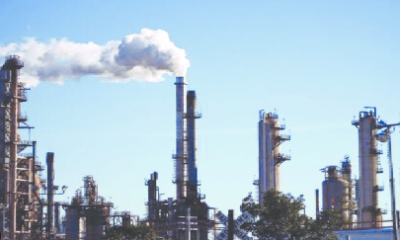Comments and Issues
The death throes of oil
Published
10 years agoon
By
Olu Emmanuel
By HAROLD JAMES
PRINCETON The price of oil is often regarded as a sort of thermometer to measure the health of the world economy. What is less often noted is that it can also serve as a barometer warning of approaching geopolitical storms. Indeed, the dramatic plunge in the price of a barrel of crude from nearly $150 in June 2008 to around $30 today is likely to fuel continued upheaval far beyond the world’s energy and commodity markets, with particularly worrying implications for the European Union.
Sinking oil prices are clearly correlated with financial instability, but the lines of causation do not point in the direction most pundits seem to believe. On the contrary, when the price of oil rises, so do costs in most rich, industrialized economies; thus, a rising oil price acts as a brake on growth. Surges in the price of oil led to global recessions in 1973, 1979, 2000, and 2008.
The reverse is also true. An economic slowdown will likely produce a price drop, which can be a financial boon for governments and consumers alike. After the collapse of Lehman Brothers in 2008, oil prices plummeted in anticipation of economic stagnation, only to recover substantially as vigorous growth continued in emerging markets. Viewed in this light, the recent drop in oil prices is unsurprising, as it follows signs of weakness in every major emerging market (with the possible exception of India).
Furthermore, oil prices today are subject to a powerful source of downward pressure: the expectation that the world economy will be restructured in response to worries about climate change. Current efforts to curb global warming may not have much bite, but in the long term, the fact that fossil fuels are major contributors to the rise in atmospheric carbon dioxide and thus climate change is likely to prompt policymakers and investors to take serious action.
ALSO SEE: Foreign investments inflow in oil sector decline by 85.7% by 2015
This leads to what the German economist Hans-Werner Sinn has called “The Green Paradox.” The possibility that the use of fossil fuels will one day be restricted creates a powerful incentive for oil producers to sell as much as they can before the limitations take effect. This logic might be behind Saudi Arabia’s response to plummeting oil prices: rejecting calls by OPEC to cut production. The result is a further decline in the price of oil and larger incentives for consumers to buy gas-guzzlers and drive more.
In the industrial world even in the United States, an increasingly important producer of petroleum low oil prices are unambiguously good for the economy in the short term. Indeed, plummeting prices are one of the few forces helping to stabilize the fragile eurozone. And worries that falling commodity prices will lead to damaging, 1930s-style deflation are almost certainly overblown.
And yet, the forecast is far from rosy. History is replete with examples of technological advances interacting with resource availability, with enormous geopolitical impact. Britain’s oak forests allowed it to become the world’s premier naval power during the Age of Sail, when a good timber supply was the key to control of the seas. The Industrial Revolution turned steel and coal into strategic goods, and struggles over oil dominated much of the twentieth century, including during World War I, when the loss of Romanian petroleum contributed to the German collapse on the Western Front in 1918.
Rapidly changing commodity prices can upend the geopolitical landscape as well, sparking political instability or worse. And today, oil seems to be going the way of timber and steel, losing its strategic importance. Large amounts of energy will still be needed for the basics of modern life, including data processing and storage, but it will increasingly come from other sources.
This is likely to have epochal consequences, as weakening oil prices undermine the authoritarian regimes that control the main producers. There is a large amount of scholarly evidence linking dependence on natural resources with poor governance the “resource curse.” Whatever the many differences among Nigeria, Venezuela, Saudi Arabia, Russia, Iran, and Iraq, all have one thing in common: Oil revenues have corrupted the political system, turning it into a deadly struggle for the spoils. As prices fall, the bandits in charge will quarrel more among themselves and with their neighbors.
The leaders of oil-producing countries are already busy concocting narratives explaining their country’s misfortunes. Venezuela’s President Nicolás Maduro has taken up the Latin American left’s old, populist slogans and pointed his finger at the US. Similarly, Russian officials are drawing parallels between today’s events and the falling oil prices that undermined the Soviet Union. In both cases, the US is to blame; hydraulic fracturing in Oklahoma or Pennsylvania, according to this narrative, is the latest example of America’s projection of power abroad.
ALSO SEE: Oil & Gas: Expert tasks operators on importance of transparency
In other words, the security challenges implied by dropping oil prices are likely to be more significant than the economic risks. But security challenges can be costly. For example, the difficulties the EU faced in 2015 are likely only to grow in scale and severity. So there is a strong case to be made for rich countries using the economic windfall from dropping oil prices to fund efforts to deal with the geopolitical consequences. In this light, German Finance Minister Wolfgang Schäuble’s recent proposal to pay for accommodation for refugees with a European petrol tax makes perfect sense.
Policymakers in industrialized countries need to stop thinking about falling oil prices as representing risks to the economy and start considering their geopolitical implications. Given the scale of the challenges likely to come, policy coordination will be necessary. The blowback from ever-cheaper oil is a problem that no country is likely to be able to deal with on its own.
• Harold James is Professor of History and International Affairs at Princeton University and a senior fellow at the Center for International Governance Innovation. A specialist on German economic history and on globalization, he is the author of The Creation and Destruction of Value: The Globalization Cycle, Krupp: A History of the Legendary German Firm, and Making the European Monetary Union.
You may like


NMDPRA – Nigerians spend N1.3tn on petrol in June amid soaring energy costs


NOGASA urges government intervention as Dangote refinery’s direct supply plan sparks industry fears


FG defends borrowing plan, claims 10 states involved


Nigeria sheds Top importer status as Dangote refinery transforms Africa’s fuel market


Kaduna women protest alleged KRPC chemical pollution, Demand action


NNPC Foundation donates 25,000 STEM textbooks and mini libraries to 25 secondary schools
Trending

 Health5 days ago
Health5 days agoDeclassified CIA memo explored concealing mind-control drugs in vaccines

 Entertainment7 days ago
Entertainment7 days agoSimi addresses resurfaced 2012 tweets amid online backlash

 Crime6 days ago
Crime6 days agoSenior police officers faces retirement after Disu’s appointment as acting IGP

 Education1 week ago
Education1 week agoPeter Obi urges JAMB to address registration challenges ahead of exams

 Health1 week ago
Health1 week agoNAFDAC issues alert on suspected revalidated SMA Gold infant formula

 Comments and Issues6 days ago
Comments and Issues6 days ago20 Critical Fixes to Save Nigeria’s Democracy from Electoral Fraud

 Football7 days ago
Football7 days agoMartínez ruled out of Everton clash with calf injury

 Latest6 days ago
Latest6 days agoICPC yet to respond to El-Rufai’s bail request as arraignment date looms

